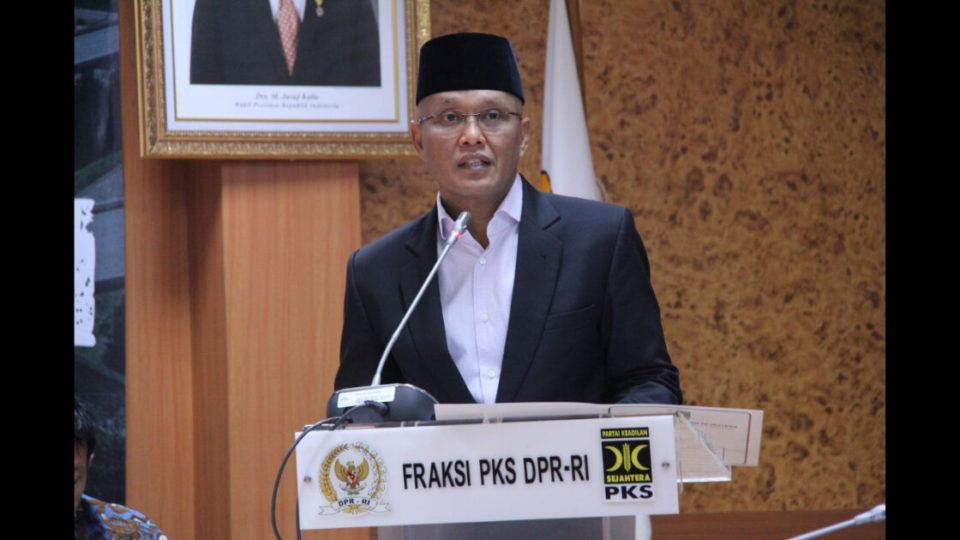The Islam-based Prosperous Justice Party (PKS) faction in Indonesia’s House of Representatives (DPR) has refused to support the Draft Law on the Elimination of Sexual Violence (RUU PKS) in the latest controversy to threaten the bill’s passage.
PKS DPR faction head Jazuli Juwaini said the party rejected the bill because it contained provisions regarding the definitions and scope of sexual violence that are not compatible with Indonesian norms.
“[The bill is] dominated by liberal perspectives that are not in accordance with the values of Pancasila, religion, and eastern culture,” Jazuli said yesterday, as quoted by Kompas.
“It could be potentially permissive of free sex and deviant sexual behavior.”
Jazuli said the party’s stance on the bill was strengthened by numerous critics and religious leaders, experts, mass organizations, and other elements of society that have rejected the bill.
“Our faction is certain to reject RUU PKS and will take constitutional steps so that the DPR will cancel the talks on that bill,” Jazuli said.
PKS on Sunday also released a statement regarding their refusal to ratify RUU PKS on their official website. It states that the PKS faction “did not necessarily reject the Bill”, but suggested four points of “important and fundamental changes”.
Two of the suggested points request changing the nomenclature of “sexual violence” to “sexual crime” and using a religious devotion approach to combating sexual crime.
The vice chairman of DPR’s Commission VIII — in which the bill has been in limbo since 2016 — Tubagus Ace Hasan Syadzily, denied the notion that the substance of the bill could potentially be permissive towards adultery or “deviant” sexual behavior (the term often used to describe sexual relations that are not between heterosexual adults).
“RUU PKS will not be directed at allowing consensual sexual relationships, or adultery or same-sex sexual relations, so the notions that say otherwise are not true,” Ace said today, as quoted by Kompas.
Ace said RUU PKS is still being discussed by the government and he would make sure to erase the articles that could potentially violate religious norms, while asserting that the bill aims to give protections to everyone, especially women, children, and people with disabilities.
He also mentioned that his commission would synchronize RUU PKS with related bills, such as the Domestic Violence Bill and the Child Protection Bill, as well as the country’s Criminal Code.
Also read: Woman behind BLACKPINK ad ban petition wants to eliminate the Elimination of Sexual Violence Bill
The Elimination of Sexual Violence Bill, which entered the National Legislation Program in 2016, was drafted by Komnas Perempuan in cooperation with the Service Provider Forum (FPL).
The bill clearly defines different forms of sexual violence and sets out the responsibilities of the state in dealing with each of those instances. It also provides for the protection of victims and witnesses, increases their access to justice, recovery and reparation mechanisms for victims and rehabilitation for offenders.
RUU PKS also acknowledges that sexual violence can take place between same-sex partners to provide protection to the victims of such crimes — that acknowledgment has reportedly been one of the major roadblocks to the bills passage.
Proponents of the bill argue that it’s ratification is desperately needed to update the current archaic laws on sexual violence (which were drafted over 100 years ago during colonial times) and bring about more comprehensive legal protections and recovery mechanisms for victims.
Under the current Indonesian Criminal Code (KUHP), broadly speaking, there are only two forms of sexual violence that are recognized, namely rape and molestation. The crime of rape in KUHP as it stands is extremely narrowly defined and limited to vaginal intercourse. This does not reflect current internationally accepted definitions and acts to deny thousands of rape victims their rights of access to justice.
The bill also includes a broader variety of sentencing options for the reformation and rehabilitation of the offenders, including community service, removal of the right to practice a profession and removal of office for public officials.
In terms of protection of children, for cases of sexual violence that occur in the domestic setting, there is a provision to terminate parental rights that will help to keep children safe from chronic abuse.




